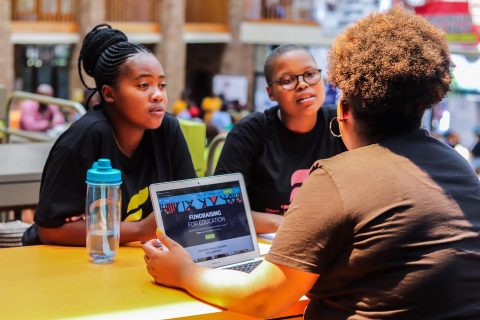Sunday Times Skills
The Value Of Work Experience
Here in South Africa, graduate unemployment grows at an unprecedented rate each year. “New graduates, many with honours and masters degrees, struggle to find jobs – often due to their lack of foundational workplace skills. Internships support the transition of new graduates into the workplace and aid the development of foundational skills on which to build their careers,” says Dr Glenda Raven, the senior manager of the Environmental Leaders Programme at the WWF-SA.
It can be hard to find work without experience, creating a vicious cycle for job seekers where they can’t find a job until they’ve had a job. Internships are the natural solution to this conundrum, delivering on-the-job training for new recruits that prepares them for the specifics of the job at hand, as well as for the broader realities of the workplace.
WWF-SA began its Graduate Internship Programme a decade ago. The first intake of seven interns in 2011 has grown to 50 in 2017. The focus of WWF’s internship is to upskill and transition post-grad students into the environment sector. “It was initiated in response to South Africa’s transition to a green economy,” says Dr Raven. “We need creative and innovative future leaders to tackle the increasingly complex socioeconomic and environmental issues and risks we are faced with.”
Graduation requirements
Internships are so useful in shaping future careers that they are are often a graduation requirement for professions as different as architecture and communications. When they form part of a professional qualification, the academic institution usually helps to direct the student into a relevant internship.
“An effective internship benefits students, the higher education institution, employers and the broader community. It enhances the formal learning experiences of the student and encourages inter-disciplinary thinking. It may affirm student career choices,” says Debbie Lees, the director of strategic projects and head of the Academic Innovation Centre at Monash.
Lees says that students often struggle to apply the knowledge that they have gained in formal learning to practical work situations. “More than that, the soft skills that are too often taken for granted are not well developed. These include self-confidence, the ability to work in teams, conflict resolution, workplace etiquette, verbal and non-verbal skills and cooperation,” she says.
Meaningful internships should take all of this into account, delivering specific outcomes through set processes. They shouldn’t merely be a box-ticking exercise for graduation.
“If a student ends up working in a rubbish design office, it can undo years of teaching value,” says Alex Opper, an architecture teacher from the University of Johannesburg. “So I try to direct my students to reputable design practices. Some universities care more, others care less.”
He says that it is not always possible to find ideal internships for students, given the current economic constraints facing South African employers, but he does his best. Where the internship is a part of the graduation requirement, a logbook must be kept of the intern’s progress and a mentor assigned to guide them. Opper says that the quality of their internship will clearly show in their design portfolio.
Graduates are not career-ready
“Most graduates would benefit from internships as it introduces them to the rigours of the world of work,” says Neruma Grobbelaar, the director of research at the South African Institute of International Affairs (SAIIA), which runs a combined one-year masters and research fellowship internship programme that is funded by the Konrad Adenauer Foundation. “Many students have an expectation that because they have completed their degree they are fully equipped for the workplace, when in fact they are simply entering a new phase of learning while delivering.”
She says that this transition is often hard, especially given the high expectations that young employees should be able to add value to their company from day one.
Teaching teachers
A teacher-intern programme run by the Independent Schools Association of South Africa (Isasa) places pre-service teachers in well-functioning school environments as teacher-interns. Lecturers from their tertiary education institutions visit the students at their host schools to observe, critique and give feedback to the students on their teaching.
“This includes their ability to handle administrative tasks, maintain discipline, how their pedagogical skills are developing and their subject knowledge,” says Lebogang Montjane, an executive director at Isasa.
Montjane explains that an effective internship is one where a mentor incrementally trusts the mentee with more responsibilities over a period of time.
“The mentor supports the mentee, but at the same time trusts the mentee enough to give them space to experiment and learn on their own – but within a structured environment with clear guidelines as to appropriate behaviour,” says Montjane.
He says that learning through self-discovery is very effective, especially when coupled with a regular, informal review process. But it’s important that mentors approach the role fully aware of their own limitations. “It is important that the mentor must not impose their style on the mentee, but encourage the mentee to develop techniques that are the most effective for them,” says Montjane.
From Intern To Mentor
“When I met with the managing director, she blew my mind. I was so impressed by her and the knowledge that she was sharing,” says Yolanda Makhubele, a former intern at Meropa Communications.
“I started a blog for one of our clients in the healthcare sector. I came up with the concept and the name. The company executed everything, but trusted me and really involved me in the process. That was a year ago. The blog still exists and I continue to contribute.”
Meropa Communications has been running a successful internship programme for three years, with the strategic intention of being systematic from the start. The company partners with the University of Johannesburg and takes in a cohort of interns every six months, selected from the Communications Faculty. They are immersed in every aspect of the client work, so that the company is sure that it has made use of their particular skills and strengths.
“It’s great for the students, but it’s also a huge advantage for an agency like ours. It helps us to continue renewing ourselves by having fresh blood coming in. Arriving fresh from varsity, the newbies aren’t tainted by the corporate environment and they are very passionate,” says Yolisa Pasipanodya, the MD of Meropa. “Those interns have shifted the dial on accounts they have worked on.”
Makhubele’s internship turned into a permanent position. “I worked hard towards it, but it wasn’t guaranteed. Three months in they told me ‘We will be making a position for you, so you don’t have to look for something else’. That felt amazing.”
Makhubele herself has now been appointed as a mentor to other interns. “I always tell them that they need to know what they want from the get-go. If you see yourself here, work for it. Let us know what you are interested in, so we can help you with opportunities. But, you have to want it for yourself.”






 Sign-up and receive the Business Media MAGS newsletter OR SA Mining newsletter straight to your inbox.
Sign-up and receive the Business Media MAGS newsletter OR SA Mining newsletter straight to your inbox.